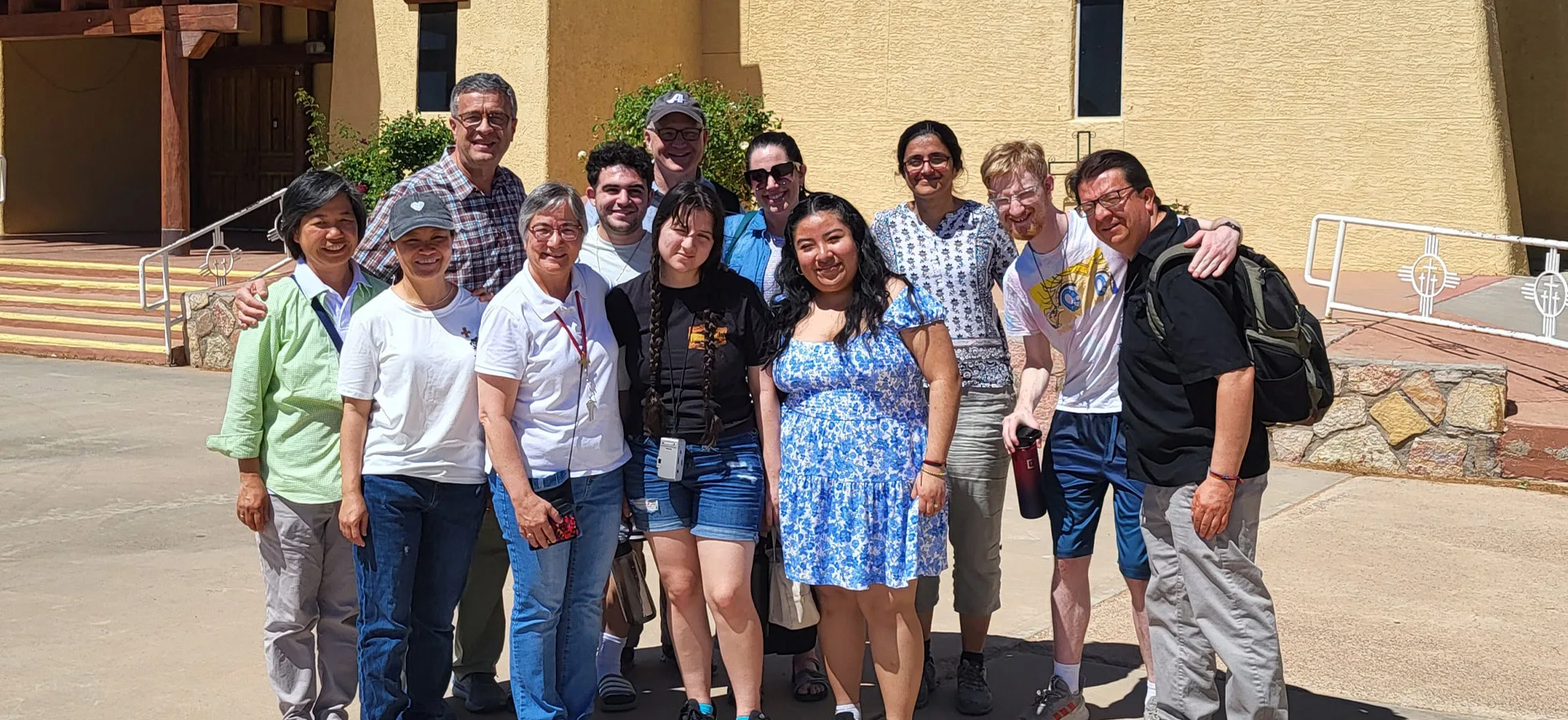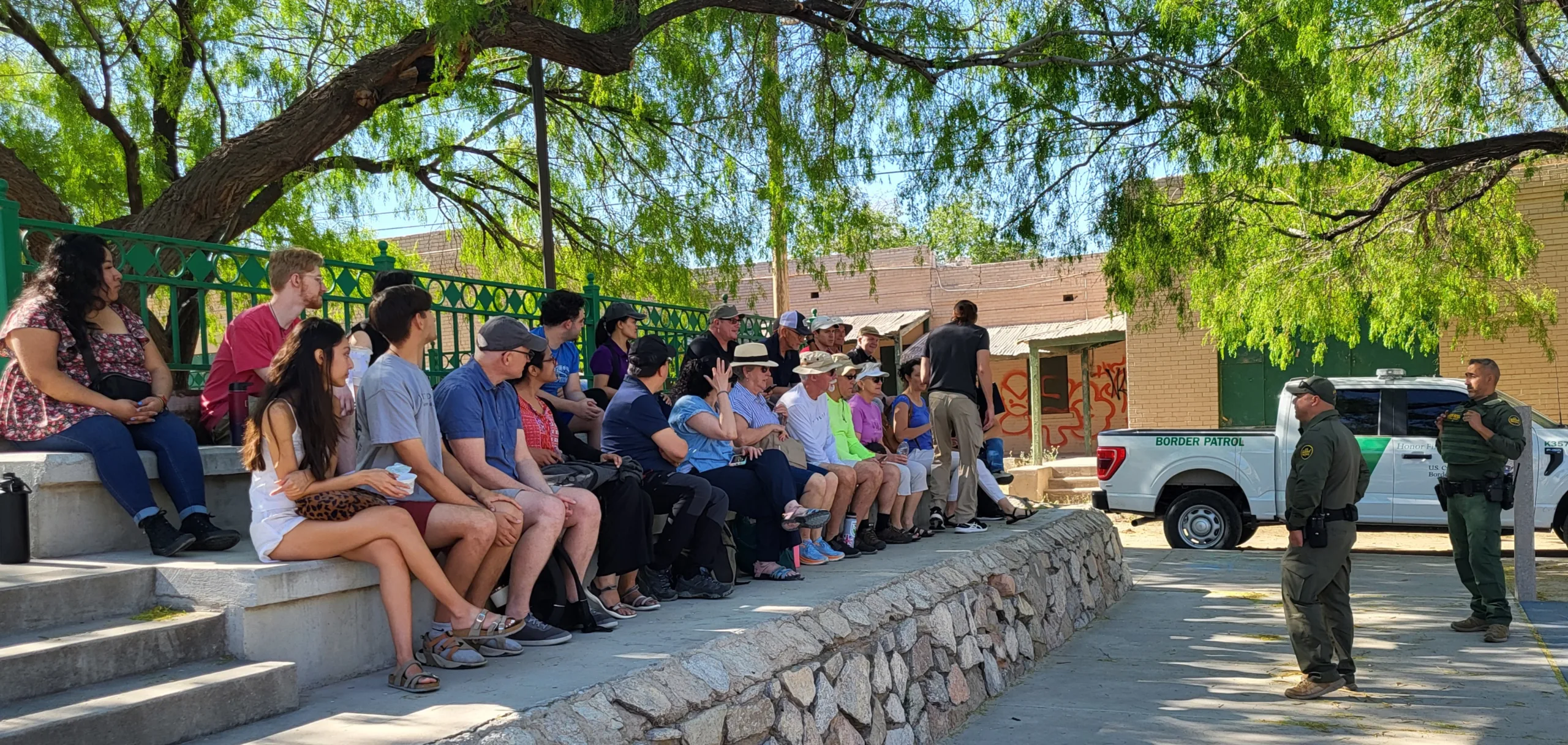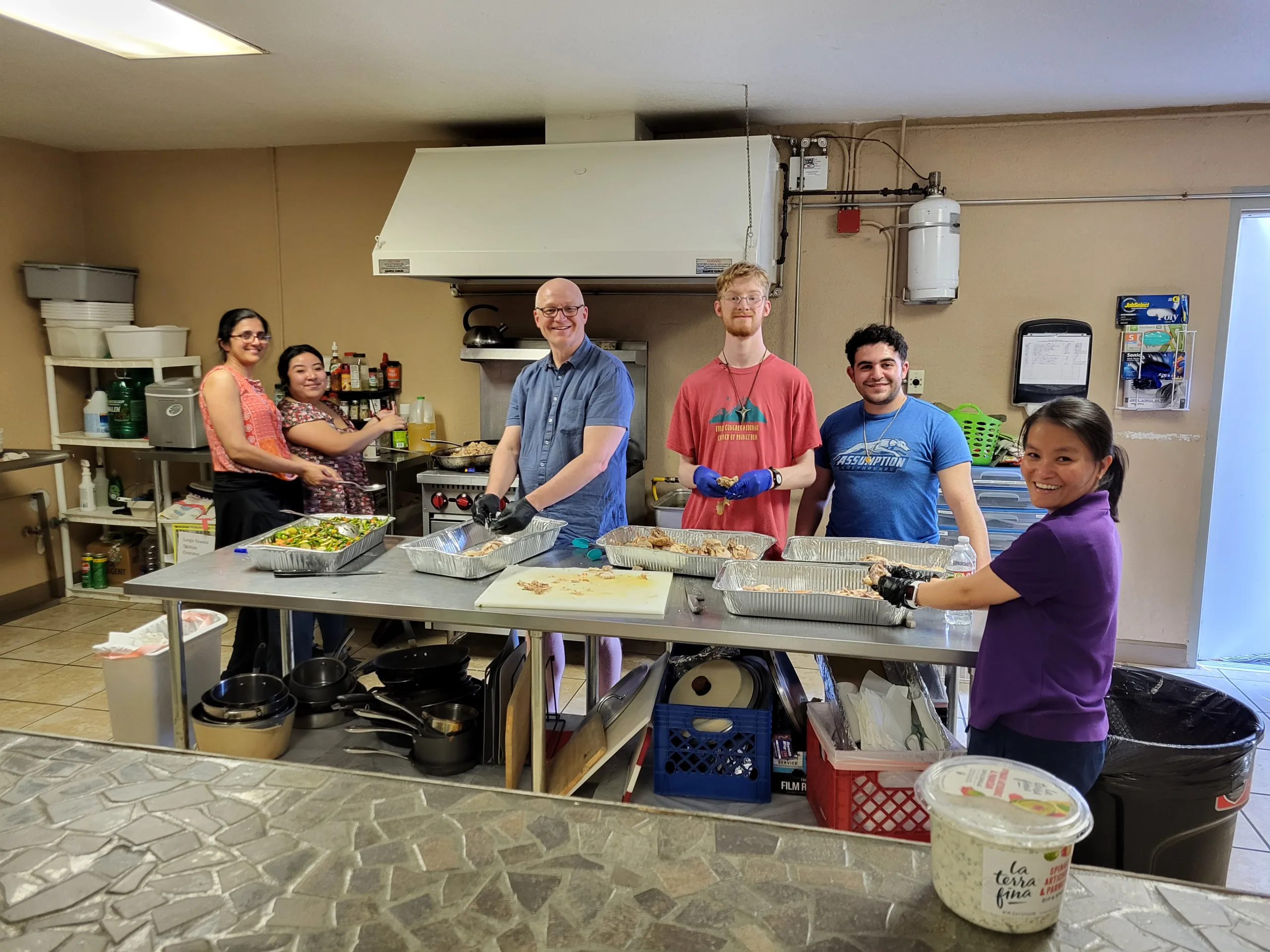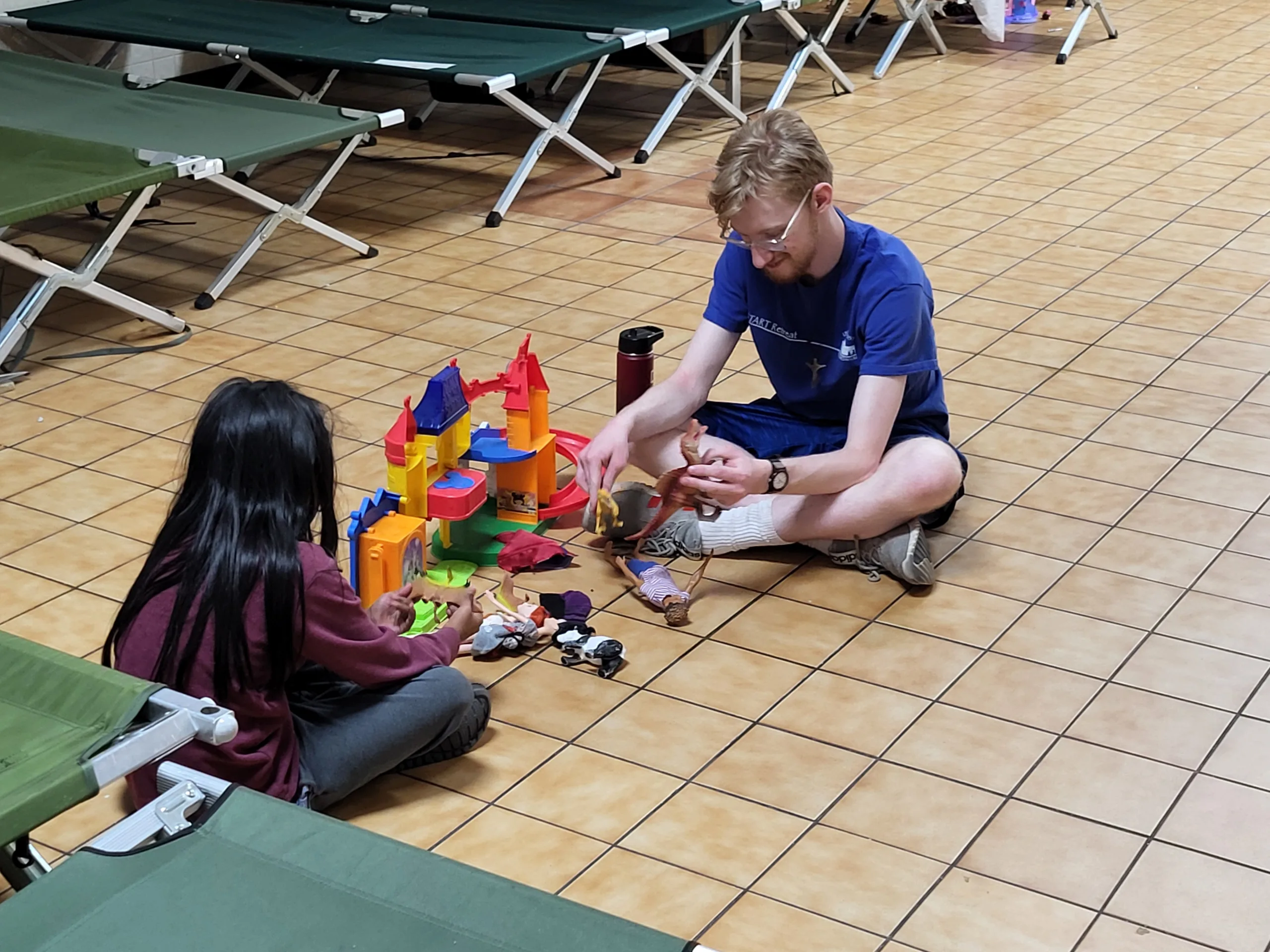“Play transcends all language”: a Transformative Experience for Faculty and Students in El Paso, Texas

Located on the southernmost border of the United States, the city of El Paso, Texas, is home to almost 700,000 people – and one of the largest international border crossings in the world.
During the middle of May, 2024, El Paso was also home to a group of five Assumption students, four faculty members, a Religious of the Assumption Sister, and a campus minister. For the third year in a row, Assumption’s Campus Ministry sponsored a SEND trip to El Paso for Assumption community members to assist the Assumptionists in providing temporary shelter to migrants from around the world. Following their crossing of the border, migrants give their intention to seek asylum in the US to border patrol and are brought to a detention facility run by US Immigrations and Customs Enforcement, where they undergo background checks. Following their release from those facilities, they are brought to temporary shelter provided by volunteers such as the Assumptionists, where they receive assistance in planning travel to family and friends in the United States where they will await their asylum hearings.
This year’s trip was the first that faculty members also joined the experience. David Crowley, professor of biology and Assumption’s D’Alzon Chair, wanted to coordinate an experience for faculty to witness Assumption’s mission in action, and decided participating in a SEND trip would be enriching for all.
“My job [as D’Alzon Chair] is to promote the mission among the faculty. And what better way to understand who the Assumptionists and the Religious Sisters of the Assumption are, than to go and watch them do their thing,” said Crowley. “So for the students and faculty to be able to interact with the Assumptionists and have a conversation about why they are doing this … to see how they’re doing it? It was a no-brainer.”
“There’s a whole other part of the Assumptionists’ life that our students and faculty never get to see here in Worcester,” said Deacon Paul Covino, the Director of Campus Ministry, and leader of the trip. “But in places like El Paso, we are able to witness and participate in another dimension of the Assumptionists’ mission: one that focuses on serving our brothers and sisters who are immigrants.”
Four faculty members took part in the 2024 SEND trip: Professor Crowley, Professor Smriti Rao, Professor Juan Carlos Grijalva, and Professor Kristen Vogel.
“If it was all faculty, it would not have been the same,” said Crowley. “The students kept us enthusiastic and kept us from getting in our own heads. I think for the students, we can ask them questions in a way that helps them to think because it’s just what we sort of do naturally. But we also were able to work side by side with them and establish a trust, establish a friendship.”
“The people made it a really great experience,” said Giselle Martinez ’24, a Health and Human Services major, who participated in both the 2024 and 2022 El Paso SEND trips. “We really got to bond with the faculty. We became close, we ate together, we laughed together, we had deep connections, and we were able to bond and reflect on the things that we were experiencing.”

Members of the Assumption community attend a presentation given by Border Patrol in El Paso, Texas.
The SEND trip was hosted by the Encuentro Project, an organization that provides educational experiences for participants regarding topics such as immigration, border crossing, and asylum seeking. Through this organization, faculty and students experienced many educational presentations that were “ both informative and transformative,” according to Covino.
“We heard a very moving presentation on the first morning we were there from a young religious sister who lives on the Mexico side in Ciudad Juarez,” he said. “She lives in a small home for women who have suffered sexual or other violent abuse on the trek, and their young children. She lives in this home that takes care of them as they prepare to come across the border. ”
Along with this first presentation, faculty and students also heard presentations from a women’s cooperative working in El Paso to better the lives of those living in the city, and presentations on the causes of migration, worldwide migration patterns, and Catholic social teaching regarding migration.
“What stood out to me about the presentations was the numbers we were given,” said Martinez. “How long it takes to get a visa, to become a citizen…A lot of people, when they think of migrants coming here, they think of poor people, but some of these families are wealthy. Some don’t want to leave their country. That’s what a lot of the presentations talked about – it’s not only low income families coming into the states. It’s people that need better resources that their country can’t offer.”
“Serving at the shelters is a main part of our visit, but there’s also an educational piece,” Covino said. “We probably heard seven presentations interspersed over the course of the week that informed what we were experiencing in the shelters. The heart and mind were both being worked all week long.”
The trips center on service, with students and faculty volunteering in different churches providing shelter to migrants across El Paso to aid workers as they welcome those migrants.
“You’re never going to really know for sure where these people end up, but they’re very hopeful. I think they’re buoyed by the experience that these shelters are able to offer,” said Crowley. “We had work to do, and we felt called to do as much as we could to help the volunteers that were there every day. It was a very powerful witness for our students, that people have committed their lives to doing this work. We were also serving the people who serve.”

Assumption community members preparing a meal at Holy Family Shelter.
“Actually being able to see what kind of volunteering, generosity, and compassion that is there in El Paso was really meaningful,” said Joey Sawicki ’25, who attended the 2022 El Paso SEND trip. “There is a kind of wall that the media puts up, where they try to put politics into the migration crisis, which loses the sense that these are actual people trying to come in and have a better life. It was interesting to see how when people are on the frontlines of the crisis they really try to help the person, and try to be there for the person, not the migrant who was just released from ICE detention.”
One of the churches providing shelter to migrants, Saint Francis Xavier Parish, founded in 1930 and staffed by the Augustinians of the Assumption since 2020, is home to the Immigrant and Refugee Project, which assists refugees from a variety of countries who cross the border from Mexico into the United States. The Project supplies refugees with clothes, food, showers, and other essentials as they await their next steps on their immigration journeys. While the Augustinians of the Assumption have no previous history in El Paso, Texas, they discerned a call of the Spirit to found a community completely dedicated to the material and spiritual care of migrants at the U.S.-Mexico border.
Covino touched on how faith played a part in the trip, allowing students and faculty to see an element of the Catholic faith they may never have come into contact with before.
“The trip gives students an insight into what the faith that animates Assumption really believes about this issue,” said Covino. “The Catholic Church has some very real things to say about welcoming and caring for migrants, and the people in El Paso are putting that into practice. During the trip, we not only learn about the rich history of Catholic social teaching, but we also witness the Assumptionists, the Religious of the Assumption Sisters and others who are bringing that teaching to life.”
Participants on the trip were also able to interact with some of the migrants staying in the shelters where they were serving; often the most powerful interactions came with children, despite a language barrier.
“Kids are kids, and their resilience is amazing,” said Crowley. “There’s a universal language of play; kids will always want to play. I’ll never forget coloring with this little girl who kept telling me what colors to use, ‘not this one, not that one’ – it was just as much fun as playing with any little kid, but at the same time, you think, ‘what have they seen? What is their experience of childhood?’”

Student Eric Lachapelle ’24 interacting with a child in El Paso.
“Although a language barrier was the case in our group, a lot of them didn’t need the language to be able to communicate with them…by simply just sitting there and trying to communicate with them, meant a lot to them,” said Martinez. “I sat with this girl, she was maybe about 10, and I was just sitting there coloring and, and she was telling me her name and her age and how she’s going to miss her family back in Venezuela, because they’re not here…they have an uncle here, but the rest of their family stayed back, and her friends are all back home.”
“One morning, I walked outside, and there’s our students out there playing soccer with all of the teenage boys,” said Covino. “They didn’t understand each other, but they knew soccer, and those rules are universal. That was pretty amazing.”
Those who took part in the trips stressed the importance of going on the trip to bear witness to what is happening at the border.
“The migration problem is one of the big problems in the world,” said Crowley. “This trip provides an opportunity to learn how your interests could serve that big problem and try to help you better understand it. I think it’s an incredible opportunity to really wrestle with a big problem that requires a variety of different perspectives to try and solve.”
“Because Worcester is so far from the U.S./Mexico border, we are often unaware of some of the basic facts and realities about migration,” said Covino. “This trip brings members of the Assumption University community right into the heart of what is today one of the most important issues in the minds of most Americans, and we have the opportunity to experience it without the filter of wherever you get your news from. You’re seeing it firsthand.”
Covino even shared a story about how students one year on the SEND trip were faced with the true proximity of what is happening at the border.
“A student was helping in the clothing room, and asked a young man in the shelter where he was going,” said Covino. “It was March, so they had to give him the right kind of clothes. So they asked, ‘where are you going?’ and he said something they couldn’t understand. They gave him a pencil and paper and said, ‘can you write down where you’re going?’ And he starts writing ‘W-O-R-C-E-S-T-E-R’…Here’s this 20 year old, talking to a bunch of our 20 year olds, and they realize that he’s going to end up being their neighbor down the street. It’s not something far away. It’s in our backyard.”
Sawicki and Martinez both encourage all students to take part in future SEND trips for many reasons, but first and foremost, they will change your perspective on not only the migration crisis, but life itself.
“This trip is unique; it helps change your views, your beliefs, and can really help you better understand what it means to find your passion,” said Sawicki. “When you go on this trip, your life will be changed. You’re going to be a new person when you come back. It’s really interesting to be able to be a part of this, to meet all of these people who are from different places with unique stories.”
“The trip is an immersion, and it allows you to do a lot of different things,” said Martinez. “You get to surround yourself with the type of people who also care about this type of work, and you’ll make good friends along the way. Take the chance.”
The next El Paso SEND trip will be held from December 14 – 21, 2024, and will include faculty, staff, and students. For more information for faculty, please contact David Crowley. For students, please contact Jonathan Bezdegian.
